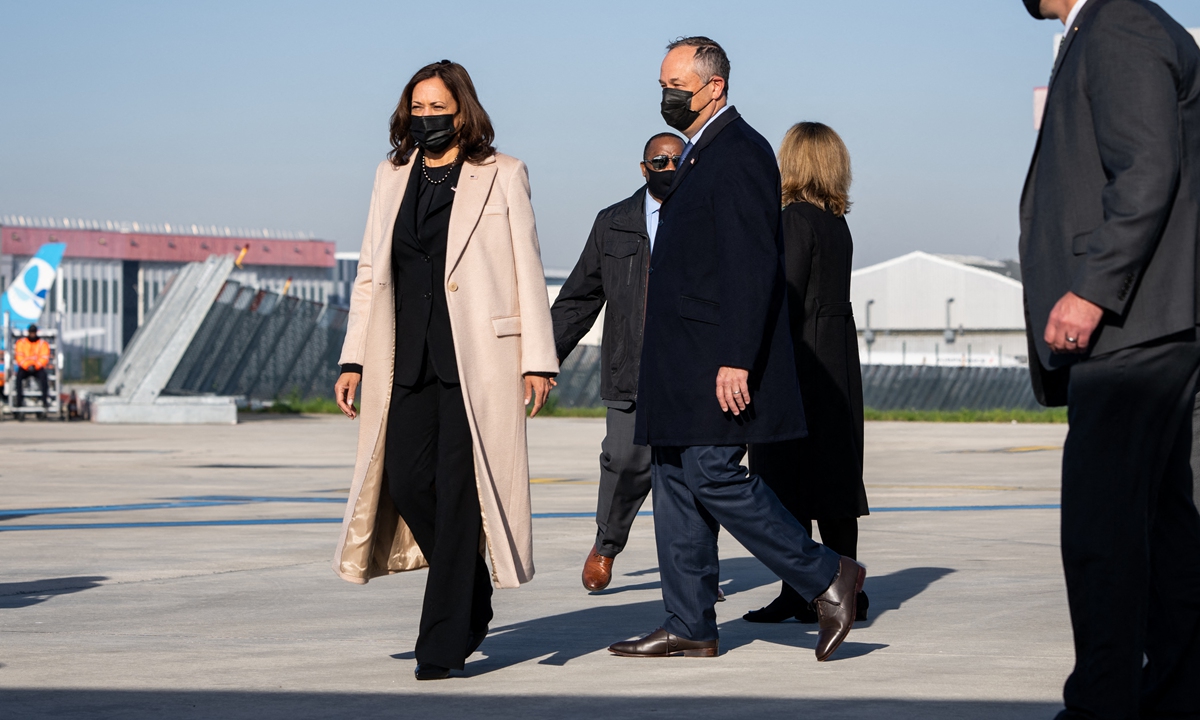
US Vice President Kamala Harris arrives in Paris, France on November 9, 2021. Photo: AFP
Amid a crisis of trust between the US and France, US Vice President Kamala Harris is now in Paris, setting off on a five-day effort to revitalize ties. In a meeting with French President Emmanuel Macron at the Elysee Palace, Harris became the third high-level Biden administration official to meet with the French president in the two months since an Australia-US-UK security deal called AUKUS robbed Paris of a lucrative defense contract with Canberra.
After stabbing France in the back, the US is eagerly sending band-aids to appease the European ally. But the US, with a bankrupt reputation, will find it hard to win the trust of its ally back. Washington scuttled Paris' sub deal worth $65 billion with Canberra. Unless the US returns the contract to France, any diplomatic move to mend fences with France is meaningless.
The visit is Harris' first to Europe in her new role. Since she assumed the position, the vice president has hardly made any diplomatic achievements, putting her foreign policy credentials under question. The delegation looks like a high-level one, but lacks substance.
The AUKUS deal has led to worsened relations between France and the US, the UK and Australia. One of the reasons why the US is looking to mend the rift with France is that France is now regarded as a negative factor in the US alliance system and its strained ties with Australia and the UK are detrimental to the US alliance system, said Wang Shuo, a professor at the School of International Relations of Beijing Foreign Studies University.
Mutual trust is completely lacking in the US alliance system. The AUKUS affair has shown the world how easily the US can betray its ally. It has also broken the illusion of those who believe US-Europe relations have returned to the honeymoon period since Biden assumed power. Although Biden sought to smooth things over with Macron in Rome on the margins of the G20 summit in late October by telling him the handling of the nuclear-powered submarine deal with Australia was "clumsy," the page will not be turned over that easily.
Australia is behaving like a hooligan. Australia shows no regret at all. Australian Defense Minister Peter Dutton earlier this month urged France to put aside any "hurt feelings" over the scrapping of the submarine contract in order to focus on the "great uncertainty with China in our region." Prime Minister Scott Morrison previously defended Australia's decision to terminate the deal with France, saying he had to "put Australia's national interests first."
"There is now a crisis within the US alliance system," said Zhang Tengjun, deputy director of the Department for Asia-Pacific Studies at the China Institute of International Studies. Although the US often claims its alliances are anchored in their shared democratic values, interests are paramount. "The US, in particular, tends to put interests above democratic values," Zhang said, adding that the US will abandon allies for its own national interests without hesitation.
The AUKUS issue has made it clear that Biden's so-called "America is back" is just another version of Trump's "America First" foreign policy. Seeking "America first," the US doesn't care about its so-called allies' interests at all. "For Europe, it will likely see a more egocentric US in the future," Wang warned.




